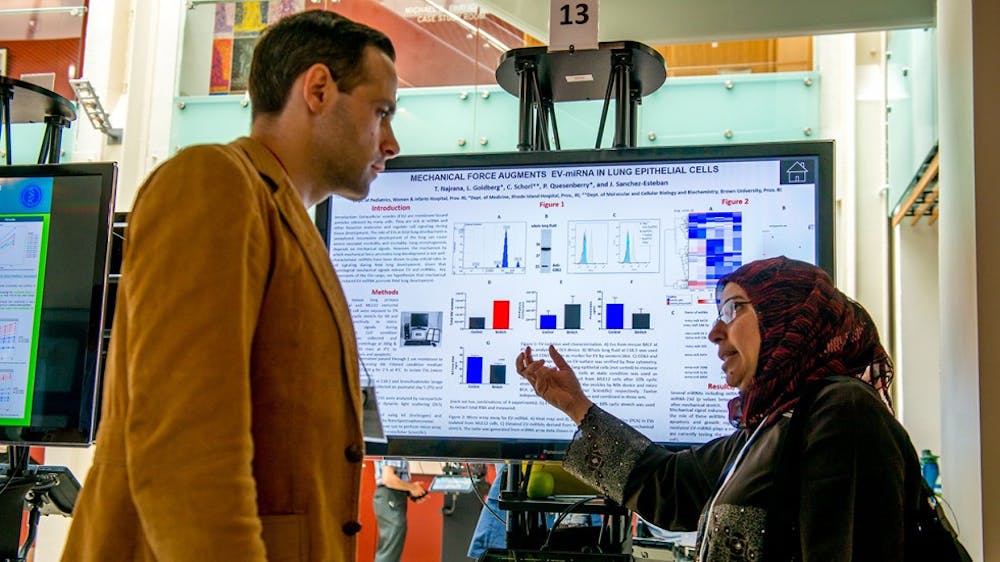Last month, the National Institute of General Medical Sciences awarded the University’s Advance Clinical and Translational Research program a $19.9M grant. This grant provides additional funding following an initial sum received in 2016.
The Advance-CTR program promotes biomedical and public health research with an emphasis on translation, or applying laboratory research to real world outcomes, said Advance-CTR Program Director Sharon Rounds. The program represents a consortium between Brown, the University of Rhode Island, Care New England, Lifespan, the V.A. Providence Healthcare System and the Rhode Island Quality Institute.
Through the Pilot Projects Program and Mentored Research awards, Advance-CTR provides seed funding to new researchers. “These awards typically go to junior faculty who are getting their research and their scholarly careers up and running,” Rounds said. These Advance-CTR grants give researchers a “jumpstart” to collect preliminary data and “develop larger research proposals that are typically funded by other outside groups such as the National Institutes of Health,” Rounds added.
Warren Alpert Medical School’s Assistant Professor of Orthopaedics Chathuraka Jayasuriya received an Advance-CTR Pilot Projects Program award from phase one of funding in 2016. Jayasuriya said he is “extremely thankful” for Advance-CTR’s support, which helped him secure his current Applied Research Award from the U.S. Department of Defense.
Receiving one of Advance-CTR’s collaborative grants allowed Jayasuriya’s lab to collaborate with Brett Owens, a Lifespan orthopedic sports medicine surgeon, to research ways to use certain cells to repair meniscus tears in the knee — an injury that can lead to arthritis.
“The fact that they promote interdisciplinary teams … makes (Advance-CTR’s programs) very strong,” Jayasuriya said. “That’s what encouraged me to reach out to Brett and for him to reach out to me and for us to work together. We still work together and we’re a very strong team now.” Jayasuriya’s team is now building on research it began with its Advance-CTR grant.
“One of the key parts of the Advance-CTR is that it’s a center that brings people together,” said Assistant Professor of Psychiatry and Human Behavior Jared Saletin, who received an Advance-CTR Pilot Projects Award in 2019. Saletin praised the program for bringing investigators together across Rhode Island and between disciplines.Saletin studies how sleep affects adolescent brain development and function. He used his grant to conduct a joint project with Assistant Professor of Psychiatry and Human Behavior Whitney Evans, who researches how eating habits and patterns affect weight loss and gain. Their joint project looked at whether the time of day during which teens eat impacts their Body Mass Index and quality of sleep.
“It (was) a complex project, but it is really a testament to Advance-CTR’s ability to do translational work with people coming from different perspectives,” Saletin said. The CTR-funded project gave him the preliminary data to secure an NIH R1 grant, as well as the flexibility to conduct experiments during the COVID-19 pandemic.
Both Jayasuriya and Saletin expressed appreciation for the non-monetary support they’ve received from Advance-CTR.
Saletin also utilized the Advance-CTR’s Service Cores, which provide expert advice and consultation in the areas of biostatistics, biomedical informatics and community engagement. The Cores “played a really instrumental role in helping recruit and retain the participants that we have,” particularly by extending access to Cores resources “even when we’re no longer funded,” Saletin said.
The Cores “continue to be a resource that I come back to,” Jayasuriya said, lauding Advance-CTR’s sense of community, accessibility and educational resources, particularly for young scientists. “(They’re) essentially part of our lab team.”
During its second five-year phase, Advance-CTR plans to continue supporting new researchers with seed funding and service cores, Rounds said. Additionally, “a big emphasis on phase two is going to be on community engagement and outreach.” She added that one of the particular focuses of phase two will be designing research projects that are responsive to the health needs of the Latinx community.
Rounds added that not only will this new grant benefit consortium researchers, but also Brown students by creating and funding opportunities to get involved in research at the undergraduate level.
“They’ve done a tremendous job during the first phase, and I expect they’re going to do the same thing (in the second phase),” Jayasuriya said.
Science “can improve our lives … but sometimes we forget that, and it’s hard to come up with a way that our research will eventually be translated to help people,” Jayasuriya said. “But (Advance-CTR) focuses on that, and it never lets you lose (sight of) how your research will impact people in the short or long term.”

ADVERTISEMENT




